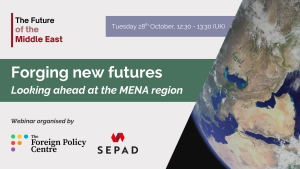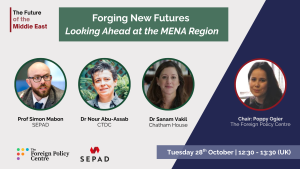Forging New Futures: Looking Ahead at the MENA Region

The Middle East and North Africa (MENA) region continues to undergo profound transformation. Over a week into the Israel–Hamas ceasefire, questions remain over the stability of the agreement. Immediate priorities around aid and reconstruction must be addressed alongside longer-term considerations of justice, accountability, and inclusive rebuilding. In Syria, the Assad regime’s collapse in late 2024, after over 50 years of rule, marked a pivotal turning point, reshaping domestic power dynamics and the broader geopolitical calculus. At the same time, the Beijing-mediated Saudi–Iran normalisation eased a rivalry that for years had amplified sectarian divides and fuelled devastating proxy conflicts. Across the region, the general public remains wary of sectarian politics. Mass protests in Iraq and Lebanon, alongside shifting civic identities elsewhere, reflect a demand for accountable governance and new forms of belonging that transcend sectarian labels.
Amid these developments, the SEPAD project explores ‘de-sectarianisation’ as a multifaceted process, ranging from popular rejection of sectarian identity politics to top-down initiatives that re-imagine and re-integrate the relationship between sectarian identities and the state. While sectarian identities remain deeply embedded in political systems, rethinking their role has become an existential challenge requiring action across every level of society; with ongoing debate that the region’s future is closely tied to moving beyond sectarianism toward more inclusive, citizen-centric models of governance.
In this webinar, speakers will explore how the region is navigating this realignment: from shifting alliances and renewed civic activism to efforts toward reconciliation, accountability, and inclusive governance that can foster lasting stability and social cohesion.
Discussion chaired by Poppy Ogier, FPC’s Research and Communications Manager.
Speakers:
– Dr Sanam Vakil, Director of the Middle East and North Africa Programme at Chatham House.
– Dr Nour Abu-Assab, Co-founder and Co-director of the Centre for Transnational Development and Collaboration (CTDC)
– Professor Simon Mabon, Chair in International Politics at Lancaster University and Director of the Sectarianism, Proxies and De-sectarianisation (SEPAD) project

This event is co- organised with the University of Lancaster Sectarianism, Proxies and De-sectarianisation (SEPAD) project as part of our ongoing project to explore ‘The Future of the Middle East’.
The event will take place on Zoom. Registration is required to attend, click here to register.
Zoom – Click here to register.
Dr Sanam Vakil, Director of the Middle East and North Africa Programme at Chatham House.
Dr Nour Abu-Assab, Co-founder and Co-director of the Centre for Transnational Development and Collaboration (CTDC)
Professor Simon Mabon, Chair in International Politics at Lancaster University and Director of the Sectarianism, Proxies and De-sectarianisation (SEPAD) project
Chair –
Poppy Ogier, FPC’s Research and Communications Manager
